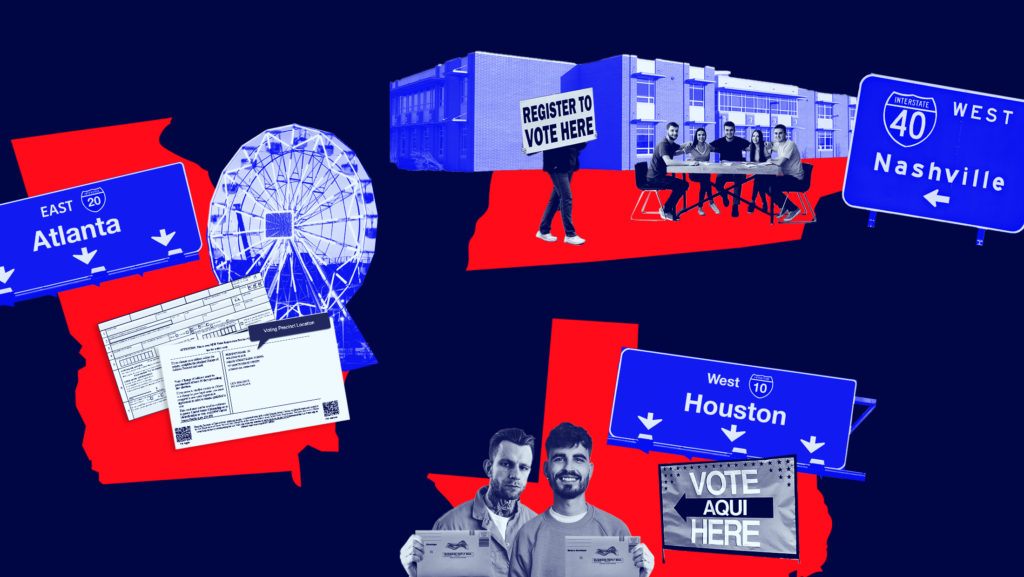To Protect Democracy in Red States, Look To Underutilized Tools

With many state legislative sessions now in full swing, voting rights advocates are spending a lot of time in their state capital buildings. In red states like Tennessee, where I live, these activists probably feel like they’re banging their heads against the walls. Most of the time, they are.
Many of the states that make it hardest to vote are home to the legislatures that are the least likely to make improvements. The harsh realities of gerrymandering mean that Republican legislators in those states likely carried their districts by double-digit margins, often as part of campaigns that trumpeted the “Big Lie.”
Voters who prioritize democracy often feel as if they don’t have a voice in red states. And while they might once have looked to Congress for national solutions to protect voting rights, many of those options now appear to be off the table.
When it comes to protecting red-state democracies, there is no silver bullet. But the decentralized nature of the U.S. election system means that local officials have a lot of power to increase voter registration and protect ballot access. And because local leaders represent the most trusted level of government, they have an outsized ability to share information that can lead to increased voter turnout.
For example, in 2021, after the Georgia Legislature adopted draconian voting restrictions, the mayor of Atlanta responded by issuing an administrative order requiring city communications — from water bills to the 311 information hotline — to include voter registration information. The order also directed staff to work with corporate and community partners to develop and distribute public service announcements about deadlines related to voting.
In Nashville, a Democratic congressman and Republican state senator teamed up to help implement a largely unenforced state law requiring annual voter registration drives at every high school in Tennessee. From 2015 to 2019, they worked with local election commissions, school boards and mayors to host friendly registration competitions between high schools. By the end of the project, they had doubled the number of eligible high school students registered to vote.
In Houston, a nonpartisan advocacy organization led by a former prison guard took on a barrier that keeps hundreds of thousands of eligible voters from casting a ballot each year: jail. The vast majority of people detained in local jails are eligible to vote, but do not have the ability to cast a ballot. Volunteers at Houston Justice helped more than 5,000 jailed voters register to vote and access absentee ballots. They also partnered with local officials to open a polling place in the Harris County Jail.
Luckily, the innovative work of voting rights advocates around the country shows that the toolbox is well stocked.
These solutions made a difference in this handful of cities embedded in red states, and they have real potential to do the same across the map. In many red states, hyperlocal work like this — which state legislatures can’t preempt or overrule — represents the best potential for progress. Right now, that potential is underutilized. But in cities like Miami, Austin and New Orleans, local leaders are demonstrating that real, if incremental, change is possible.
New federal tools also offer hope. While federal legislation that provides comprehensive solutions seems stuck in the halcyon early days of the 117th Congress, Executive Order 14019, issued by President Joe Biden in March 2021, gives advocates a new opportunity to increase voter registration rates in historically disenfranchised communities.
A sometimes forgotten clause in the National Voter Registration Act (NVRA) — “the Motor Voter Act” requiring DMVs to register voters — allows states to designate other federal offices within their borders to act as voter registration agencies. Biden’s executive order requires federal agencies to accept that designation when asked to do so.
Given the degree to which the NVRA has increased voter registration rates among historically disenfranchised communities, this executive order could be a powerful tool. And it is already starting to take hold in red states. Kentucky’s Republican secretary of state has already announced that the Bluegrass State will partner with the U.S. Department of Veterans Affairs (VA) to provide voter registration materials and assistance to veterans, their families and caregivers while they access services at VA health care facilities in the state.
Biden’s executive order could also turbocharge voter registration for the nearly 950,000 immigrants who become American citizens each year at naturalization ceremonies. If a state asks the U.S. Citizenship and Immigration Services (USCIS) offices within its borders to accept designation at voter registration agencies, USCIS representatives would in many cases be required to provide DMV-like voter registration opportunities to the newly minted citizens at these ceremonies. By their very nature, virtually all of these new citizens — most of whom are people of color — are eligible to vote but remain unregistered. Few events offer greater voter registration opportunities.
If there were ever a time to use every possible tool to protect democracy, it is now. Luckily, the innovative work of voting rights advocates around the country shows that the toolbox is well stocked.
These local and federal solutions, and others like them, are described in more detail in the new Democracy Protection Playbook. It launched today to fuel efforts to defend and expand voting access, particularly in states where that access is threatened. While no one tool is a panacea, each has real potential to drive change in places where progress might otherwise seem impossible. Taken collectively, these tools will help ensure that all eligible voters have access to our democracy’s most fundamental right, no matter in which state they live.
Shanna Singh Hughey is an Emerson Collective fellow who founded a voting rights think tank in Tennessee, which she then ran for six years.